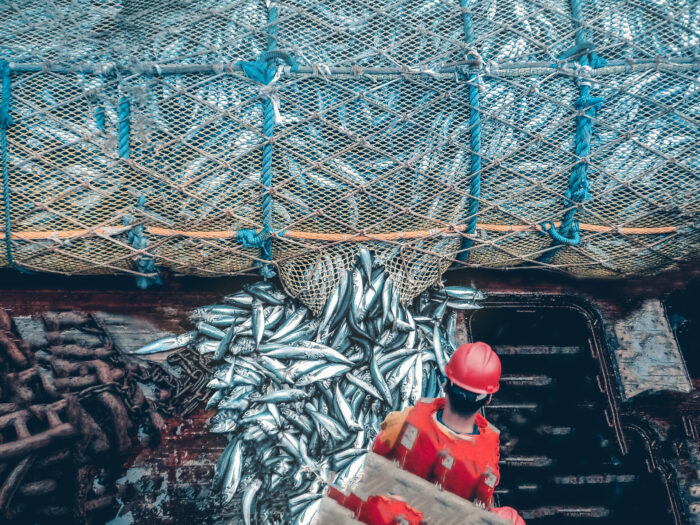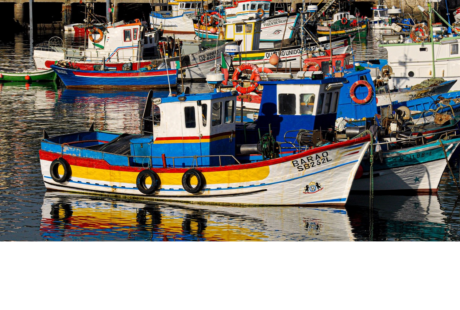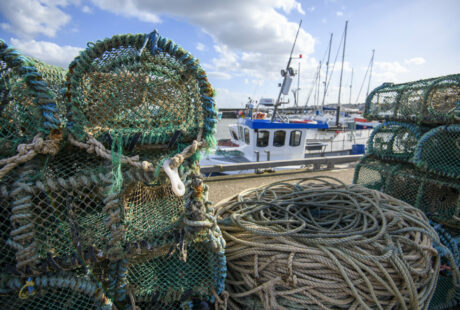Depletion of fish populations, habitat destruction, bycatch of sensitive species, water pollution… Wild fisheries is one of the key drivers of biodiversity loss at sea, according to the 2019 UN IPBES global assessment report on biodiversity. Despite recognition of the issue, however, the latest leaked draft of the upcoming Farm-to-Fork Strategy [1] by the European Commission pays little attention to the harmful environmental impacts of seafood production.
The Strategy’s lack of comprehensive measures and targets for a full transition from fuel-intensive, non-selective and destructive fishing to low-impact fisheries is striking. A full transition requires fishers to reduce their impact on the marine environment by preventing the destruction of essential marine habitats, bycatch of undersized and unwanted fish and the killing of sensitive species like cetaceans, seabirds or turtles. Low-impact fisheries would also use less energy per tonne of fish caught, by using passive fishing gear that requires less fuel and by securing healthy fish populations (the more abundant the fish population, the easier they are to find). No EU citizen wants to eat fish that comes from an overfished or depleted fish population, or that is caught at the expense of iconic species like dolphins, seabirds or turtles.

Our ocean is in crisis. If done right, farmed seafood from aquaculture can provide relief to wild fish stocks and the marine environment, while supplying the increasing demand for protein. However, current aquaculture practices have several negative environmental impacts that impact their sustainability. The European Commission’s Farm-to-Fork Strategy misses the opportunity to better control the growing aquaculture sector in Europe and ensure that future aquaculture practices are environmentally responsible. Simply adding ‘sustainable’ to aquaculture is an ineffective safeguard. Instead, an aquaculture target is needed to address ecosystem-based spatial planning, feed, escapees and nutrient issues. The Commission needs to ensure that the newer, innovative algae industry develops within the EU regulatory framework, licensing procedures and with the necessary environmental impact assessments.
The Strategy states – inaccurately – that fish consumption by EU citizens is ‘insufficient’, with an underlying assumption that it should be increased. In fact, statistics show that Europeans eat on average 40% more seafood compared to Member States’ health guideline [2][3]. Promoting the consumption of seafood overlooks the fact that its production negatively impacts the ocean’s ability to cope with climate change. Coastal habitats, for instance, are regularly destroyed by bottom-trawling, despite capturing CO2 40 times faster than tropical forests [4].
It is evident that the European Commission, while consulting regularly with agriculture stakeholders (NGOs, sectors, other interests) in developing the Strategy, failed to appropriately consult the relevant stakeholders in fisheries and aquaculture. The Farm-to-Fork Strategy is intended to lead the EU into a new age of sustainable and healthy food production system. Without sufficient consideration for the massive impacts of industrial seafood production on marine ecosystems, however, it is destined to be a failure.
The Farm-to-Fork Strategy is not yet finalised, meaning there is still time to correct its course. We urge the European Commission to revisit the draft and deliver a strategy that will enable a transition to truly sustainable and low-impact seafood production in Europe.
Posted on: 26 March 2020



